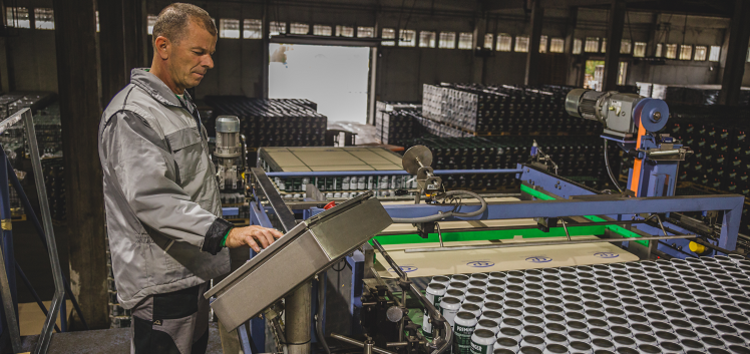Brewing has a long tradition in Bosnia and Herzegovina. Beer is among the population’s favourite drinks, especially in the summertime when demand can go up by a staggering 300 per cent.
This year the sales have been even higher than usual, most likely due to the football World Cup, explains Mr Edin Ibrahimpasic, CEO of Bihacka Pivovara.
“We’re proud to be one of the few independent breweries in Bosnia and Herzegovina,” he says. “Our Preminger brand is the most popular of our range: in total, we sell over 8,600,000 litres per year.”
“We also offer ice tea, juices with pieces of fruit, aromatised water, bottled spring water and other drinks. In short, we produce all refreshments needed for a warm summer day or a thirsty moment at any time of the year.”
Building a competitive business
The EBRD has supported the drinks producer with a €1 million loan through a local partner bank, Sparkasse Bank Sarajevo. This helped the company to buy a new beer-filling line and system and other equipment, allowing it to improve beer production and packaging.
“For a local brewery like ours it’s vital to provide a high-quality product – it’s the very reason why our customers choose our drinks,” says Mr Ibrahimpasic. “The additional investments have further advanced our position on the market, since they ensure our products’ safety and quality, health and safety at work and avoid unnecessary waste and related costs.”
All drinks meet the necessary European Union (EU) standards to be exported. While they’re only locally distributed for now, this provides the brewery with the option of expanding to other markets in the future.
The EU provided funds for the project, which ensure that the most suitable equipment is chosen and its installation verified later on. They also include an incentive payment to participating businesses to help create a market for such investments in the future.
“One of our key goals in Bosnia and Herzegovina is to support the growth of small and medium-sized enterprises, which are the key engine of the local economy,” says Ian Brown, head of the EBRD office in Sarajevo.
“Our investments help to increase the company’s competitiveness both on the local market and for the purposes of exporting their goods and services.”
Andrea Vera, Head of Operations Section for Economic Development, Trade, Infrastructure and Natural Resources at the EU Delegation to Bosnia and Herzegovina, highlights the need for Bosnia and Herzegovina to improve its business climate and create opportunities for economic recovery.
“This programme represents a continued EU effort to help Bosnia and Herzegovina in tackling the obstacles that hamper development of SMEs, which are the backbone of the economy,” he said.
“The EU has provided around €70 million to support the SME sector in the country over the past 15 years. With our technical assistance and grant funding, SMEs have received tangible support to grow in competitive sectors such as tourism, agro-processing, and the wood and metal industries.”
The drinks producer in Bihac is one of several dozen businesses which have benefited from the EBRD’s and EU’s support to invest in new equipment and processes and comply with EU standards.
The activities have supported a broad range of beneficiaries, ranging from glass producers to wood manufacturers and agribusinesses.
Creating job opportunities
In the case of Bihac Pivovara, the EBRD and EU have been long-time partners in the brewery’s development. It also benefited from a credit line several years ago to invest in various energy efficiency measures, including the replacement of an old boiler and buying other energy-saving equipment.
“Our brewery has grown to employ over 100 staff since we started our work,” Mr Ibrahimpasic says. “Our continuous investments have helped us to become a greener and highly competitive business which can offer excellent products to its customers.”

